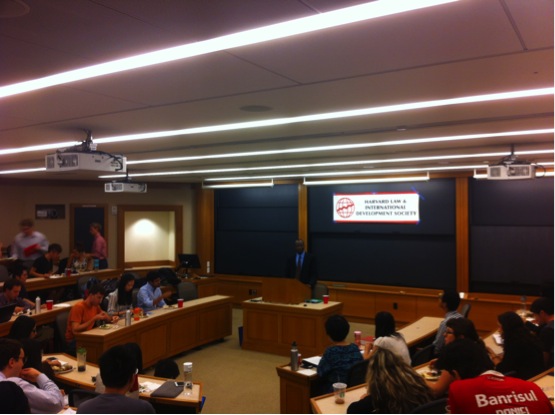October 7, 2013 – Cristoforo Magliozzi
Is China propagating a new wave of exploitation in Africa or is it beneficially recasting the position of Africa in the global economy? Cornell Law Professor Muna Ndulo suggested a bit of both in his visit to Harvard Law School on Thursday, Oct. 3, while contextualizing broader international investment practices in Africa and China’s investment elsewhere in the world.
Ndulo cited the role of China supporting anti-apartheid guerrilla movements in 1994 South Africa to illustrate that self-interest always reigns in how governments relate to one another. Whether a beneficial or detrimental outcome results depends on whether interests converge.
The scope of Chinese influence must also be well-considered—a minority of African nations today that do not have some form of democracy, and each iteration is nuanced. One cannot presume that Chinese investment props dictators or impedes the progression of human rights; the consequences of Chinese investment must be considered on a nation-by-nation basis.
In some instances, the Chinese non-interference policy on investment might actually boost rights tied predominantly to economic and not structural factors in ways that the conditional policies of other nations may fail to produce. And one must also remember the tremendous role that other foreign investment in Africa plays, such as from Europe and the United States. China is not a lone player on the continent, and moreover, it might be a proportionally bigger player on other continents when one inspects how invested China is in Brazil, for example.
By whatever causal factors, there is no denying that there is a shift in the African narrative from being the “hopeless continent” a decade ago to the “rising continent” today—predicted by the IMF to claim 7 slots of the world’s top 10 fastest growing economies over the next five years.
Insofar as rising commodity prices—some due to China imports on goods like copper—African nations must plan to safeguard themselves against the economic shocks a disruption of demand would bring. Given that, Ndulo pointed to Chinese motives as more than extraction of raw materials. China is also invested in African banks, manufacturing, and infrastructure. This is not to say these are for altruistic reasons—China is motivated to create new markets for its exports and to take advantage of international markets through Africa—such as obtaining indirect benefits from Africa’s free trade provisions with the U.S. through the African Growth and Opportunity Act.
Looking forward, African nations must raise capital with borrowing and investment being the two predominant options. Looking at borrowing-induced financial crises of the past, investment from China and elsewhere seems the way forward provided that gains are consolidated within Africa and harnessed for lasting change.


An interesting discussion is worth comment. I believe that you ought to write more
on this subject, it may not be a taboo subject but generally people do
not discuss these subjects. To the next! Cheers!!